Welcome to another Winter Blog Blast Tour! While Tanita is getting truly blasted by winter in Frosty Olde Scotland, and temps in California dip below freezing at night, turning Californians into popsicles (and making the rest of the country laugh at our wimpiness), we’re still plugging away to bring you an amazing series of interviews with authors and illustrators. Check out the full schedule at Chasing Ray.
Today, we’ve invited Josh Berk, author of The Dark Days of Hamburger Halpin, to join us, and he’s answered our nosy questions in inimitable style. Dark Days is a mystery told from the perspective of a deaf high school student, so naturally we had a lot of questions about issues of character and genre. So without further ado, here we go!
Josh Berk: First of all, I’m so glad you loved Ebony! She wasn’t in the first draft at all and totally came to life from my editor’s suggestion that we meet some of Will’s old friends from his deaf school. So she started just from that little idea and went on to become a pretty well-rounded character. I totally think of her as a real person and if I do a sequel I think it will be more Ebony-focused. I’m picturing a mystery involving high drama at the Deaf school which Will and Devon help crack. But I haven’t shared this thought with my publisher and I really have no idea if they’d go for it. I hope so! It’s fun to consider, though the next few things I have underway are all not Will & Devon books. So the answer is “maybe” and “not for a long time if at all but thank you thank you thank you for asking!” 🙂
My next few books are mysteries, but I don’t think I will only write mysteries. If I’m lucky enough to keep publishing I would certainly like to try other types of stories. But will all my novels be funny books? That’s a good question! And a timely one. Because just yesterday I was going through some old files and I found the opening paragraphs for a completely melodramatic YA novel. I read it to my wife and she was like “I like it. It’s really different. It’s really good.” And I was like “Do you think I could sustain this tone for a whole book?” And she was like “No.” Haha. She’s probably right.
I’m not against trying, but I don’t think I could sustain seriousness. I do hope my writing matures as I continue in my career. I think about Woody Allen — I read where he described his early works as basically being excuses for jokes. The plot and character and everything else was secondary. And then towards the middle of his career his plots and character development got deeper while his jokes remained funny and those movies are recognized as his greatest achievements. AND THAT’S THE ONLY EXTENT TO WHICH I HOPE MY LIFE MIRRORS WOODY ALLEN’S.
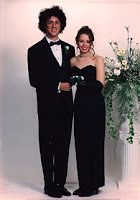 JB: Ha! Well, most of this is true. The thing about the Japanese reality show is actually not true. I don’t know why I said that in an interview. It’s a total lie. I think it’s Suzanne Young’s fault somehow? I’ve never even been to Japan. I was on Maury Povich once… But, OK, yes, the rest of that stuff happened even though I don’t really think of myself as an extrovert. I was pretty reserved and maybe even a bit shy through much of adolescence. I tried hard not to be weird, which of course never works, and then the pendulum sort of swung wildly and I started acting out, having crazy hairstyles, playing in punk bands, and being a nude model… OK, “nude model” is sort of stretching it. (So to speak?) I just stood naked in figure drawing classes for my college art department. I wasn’t chosen because of my looks — I was chosen because I was willing to stand around naked for low pay. Still, it was a good job. And no, I did not have the Berkfro at that time! I had the classy hairstyle known as “the Mr. T.” Somewhere in the world there exist some pretty funny drawings… And a while later I did have a bet with some friends about who could get into Playgirl first. We all lost, or in other words: the world won. Wait: what was the question? What job would I never want to try? I’m going to say soldier. I would be really bad at that.
JB: Ha! Well, most of this is true. The thing about the Japanese reality show is actually not true. I don’t know why I said that in an interview. It’s a total lie. I think it’s Suzanne Young’s fault somehow? I’ve never even been to Japan. I was on Maury Povich once… But, OK, yes, the rest of that stuff happened even though I don’t really think of myself as an extrovert. I was pretty reserved and maybe even a bit shy through much of adolescence. I tried hard not to be weird, which of course never works, and then the pendulum sort of swung wildly and I started acting out, having crazy hairstyles, playing in punk bands, and being a nude model… OK, “nude model” is sort of stretching it. (So to speak?) I just stood naked in figure drawing classes for my college art department. I wasn’t chosen because of my looks — I was chosen because I was willing to stand around naked for low pay. Still, it was a good job. And no, I did not have the Berkfro at that time! I had the classy hairstyle known as “the Mr. T.” Somewhere in the world there exist some pretty funny drawings… And a while later I did have a bet with some friends about who could get into Playgirl first. We all lost, or in other words: the world won. Wait: what was the question? What job would I never want to try? I’m going to say soldier. I would be really bad at that.
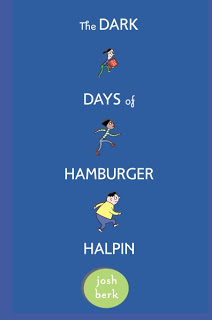 JB: I was recently on a panel with Mitali Perkins, and she quoted someone (can’t remember who) who said something like “If you cross a border to tell a story, make sure you’ve held plenty of babies on that side.” I like that very much. It’s not impossible to to cross a border to tackle a character from a different community, but it should be treated rather seriously. I know there are some taboos about writing across racial boundaries, but I’m in favor of it. I’m in favor of writing across all boundaries. If done correctly it can increase empathy and understanding. The world could always use more of those things.
JB: I was recently on a panel with Mitali Perkins, and she quoted someone (can’t remember who) who said something like “If you cross a border to tell a story, make sure you’ve held plenty of babies on that side.” I like that very much. It’s not impossible to to cross a border to tackle a character from a different community, but it should be treated rather seriously. I know there are some taboos about writing across racial boundaries, but I’m in favor of it. I’m in favor of writing across all boundaries. If done correctly it can increase empathy and understanding. The world could always use more of those things.
The most memorable thing I learned while researching HALPIN is that deaf people are hilarious. There is a great sense of humor in the Deaf world (including some filthy sign language jokes). That and the simple revelation that deaf kids are just like anyone else.
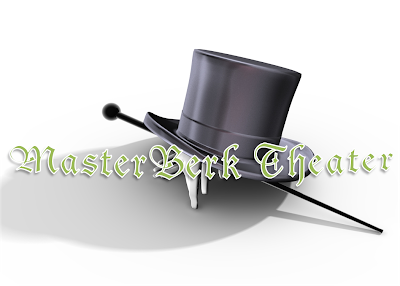 JB: I think I did OK! The idea is fairly confusing to hearing people, that Deafness is not thought of in the Deaf world as a disability, but rather simply a different way of living. It took me a while to grasp that, but I’ve always been fascinated by sub-cultures and I was able to have empathy for that point of view. I made one or two small mistakes in the book with regards to deafness/signing that some folks in the the Deaf community have been happy to point out to me, but mostly everyone has been really cool about it. They seem to like Will and they seem to appreciate the effort I made to understand their world. It’s certainly stressful to try writing a book about a community to which you don’t belong.
JB: I think I did OK! The idea is fairly confusing to hearing people, that Deafness is not thought of in the Deaf world as a disability, but rather simply a different way of living. It took me a while to grasp that, but I’ve always been fascinated by sub-cultures and I was able to have empathy for that point of view. I made one or two small mistakes in the book with regards to deafness/signing that some folks in the the Deaf community have been happy to point out to me, but mostly everyone has been really cool about it. They seem to like Will and they seem to appreciate the effort I made to understand their world. It’s certainly stressful to try writing a book about a community to which you don’t belong.
The narrator of my next book is a lot more like me than Will is. It’s been sort of a relief to not have do so much research and just let the character flow from my own life experiences. But writing and researching Will was definitely a fun and enlightening experience and I certainly plan to write about characters of all sorts down the road. I have a few pages of a novel from the point of view of a Guatemalan adoptee and that’s a world that’s very foreign to me. The only thing I’d never try is to write as a girl. No matter how much research I do, girls are beyond my understanding. Girls are so weird! Just kidding. (Sort of.)
JB: The fact that I have a blog and an online presence is honestly mostly attributable to luck. I didn’t have any of those things until I had a book deal and joined the 10ers. To be part of the 10ers site you have to sign up for a LiveJournal account so once I did that Heidi Kling kept saying “You should blog, Berk! It would be funny!” And as everyone knows, you do whatever Heidi says. It’s a law.
And then she asked me to do the 10ers Twitter feed. At this time I had no idea what Twitter was, but again I did it because Heidi asked. Once on there I realized that Twitter wasn’t just useful for pushing out the promo/newsy type stuff we wanted to get out as the official 10ers, but also was a perfect format for weird/funny/idle thoughts and general goofing around. In other words, it was the perfect format for me! So then I signed up for my own @joshberkbooks Twitter page & I ran with it. It’s certainly not a chore and is actually too much fun. (I say “too much” because it’s a productivity-killer.)
It certainly has created a certain image for me as an author, at least within the YA world. People meet me at conferences and are like “I know you from the internet!” I don’t know if it’s actually helpful to my career or if it helps me reach readers in a significant way. I mainly do it because I find it to be fun… I guess that’s what I’d pass along. Just do what feels natural and fun. Also, try to mix it up. I make videos (mostly MasterBerk Theatre, which again, started just sort of randomly, on The Book Chic’s blog), I make songs, I interview other writers, and I tweet far more often than I do traditional blog posts. I think that sort of thing keeps people interested.
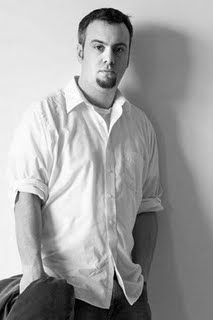 And finally, the best piece of advice to get your name out there in the social media world is probably to surround yourself with people more interesting than yourself. My “release day” video has lyrics written by Kiersten White! She’s a best-selling author! And far wittier and funnier than I’ll ever be. And my funniest/most-attention-getting blog stunt was when Sarah Ockler pretended to boycott my book. A good stunt is always good! But mainly that worked just because Ockler is so funny and wonderful — being able to bounce funniness off of her and my other author buds certainly has helped get my name out there in a way I could never do alone.
And finally, the best piece of advice to get your name out there in the social media world is probably to surround yourself with people more interesting than yourself. My “release day” video has lyrics written by Kiersten White! She’s a best-selling author! And far wittier and funnier than I’ll ever be. And my funniest/most-attention-getting blog stunt was when Sarah Ockler pretended to boycott my book. A good stunt is always good! But mainly that worked just because Ockler is so funny and wonderful — being able to bounce funniness off of her and my other author buds certainly has helped get my name out there in a way I could never do alone.
The final thing about social media that I’d like to share with aspiring writers is to avoid it like the plague! Just kidding. Sort of. (It really can be a productivity-killer.) The writing always needs to come first, which is advice I could do well with following more myself…
5 ½. Most other YA novels, if they introduced a character who was a self-proclaimed “Hefty Houdini,” would have then made some sort of case for the character losing weight, or at least concerning himself about his size.
Seriously. Think about it.
Fat kids in a lot of YA fiction are either a.) socially unacceptable BECAUSE they’re fat, b.) hysterical/miserable because of perceived fatness, c.) in awe that they are being the gift of a boyfriend, a friend, an interesting space in the book in spite of their fatness, or d.) the BULLY of the piece.
Rare is the bird who just gets to be fat and we move on.
Will takes a moment to briefly visit the idea of suddenly becoming a runner or something, then dismisses it, making a bald statement that some people just like to eat. So, here’s the question: Did you buck the panic-about-obesity trend purposefully? Did you create a big guy character with the idea of making a deliberate statement, or – ?
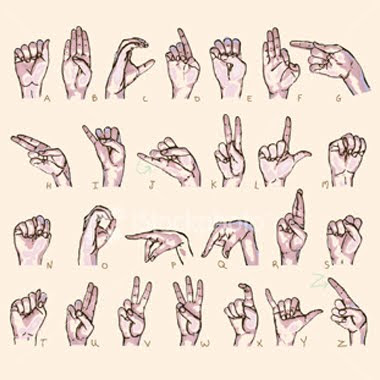 JB: This is a great question! Great observations. I should explain that Will is very loosely based on a kid I knew when I was young. There was an overweight deaf kid in my elementary school and he popped into my mind as soon as I had the idea to write a deaf character. He was a very happy, laid-back kid, but I imagined that being hefty and deaf might have made high school tough for him. (He didn’t go to my high school so I never knew.) As soon as I imagined his teenaged life as this hefty deaf kid, Will’s sardonic voice was born. I knew that most works of fiction would, as you say, make the case for him losing weight, but I knew Will wouldn’t. I knew near the end he’d be like “And then I got all skinny and buff. Just kidding. That never happened.” It wasn’t really a deliberate statement, as much as it just seemed like something that Will would say. It felt like it would do him a disservice to change it, even though I’m of course aware that the issues surrounding obesity are serious ones.
JB: This is a great question! Great observations. I should explain that Will is very loosely based on a kid I knew when I was young. There was an overweight deaf kid in my elementary school and he popped into my mind as soon as I had the idea to write a deaf character. He was a very happy, laid-back kid, but I imagined that being hefty and deaf might have made high school tough for him. (He didn’t go to my high school so I never knew.) As soon as I imagined his teenaged life as this hefty deaf kid, Will’s sardonic voice was born. I knew that most works of fiction would, as you say, make the case for him losing weight, but I knew Will wouldn’t. I knew near the end he’d be like “And then I got all skinny and buff. Just kidding. That never happened.” It wasn’t really a deliberate statement, as much as it just seemed like something that Will would say. It felt like it would do him a disservice to change it, even though I’m of course aware that the issues surrounding obesity are serious ones.
The other thing I’ll say is that I was inspired by the movie “School of Rock.” Specifically, I was inspired by the audience’s reaction to the scene where Jack Black’s character tells Tomika that it’s OK that she’s chubby because she’s still awesome. He makes a comment about how he too should probably go on a diet but that refusing to diet isn’t a crime. I saw the movie in a theater with a mostly young audience and this line got a HUGE reaction. The young people in the audience laughed and sighed and even applauded. So, yeah, I wanted to create that same reaction. I wanted a reader who might be struggling with their weight and worrying about dieting and feeling crappy all the time, to read that line, smile, take a breath, and relax about it for a minute.
Lightning Round, Cause We Still Can’t Stand To Be Done:
1. Writing Drug of Choice: Caffeine or Candy?
I do enjoy candy far too much, but when writing it’s always caffeine in dangerous doses. DANGEROUS DOSES.
2. Laptop or longhand?
I do most of my “serious” writing on the computer, but I definitely still take time to scribble in a notebook pretty much every day. I like longhand for jotting down ideas or taking notes or making up weird poems on scraps of paper. The only problem with that is I almost always lose the papers.
3. Coffee shop crowds or solitary scribbling?
Solitary, baby. Why did I say “baby?” I like to be in a really boring setting to force me further into my own mind rather than focusing on the outside world. My favorite writing place is the most boring place in the world. Even the chair is boring.
4. Would you prefer to be Rock-star popular or a Literary Award-winner?
I’m so glad you asked this question! Because I read an interview where this was asked a while ago and I’ve been thinking about how I would answer for a long time. The truth is I never ever thought I’d be either. I have always thought of my style as a bit too low-brow for award-winner and a bit too quirky for rock-star popular. I always imagined I’d be “cult favorite,” meaning that I’d neither win awards nor top charts, but rather have a small and devoted cult following of weirdoes who loved what I was doing. But if I HAD to choose between “rock-star popular” and “literary award-winner” I’d go with rock-star because, um, I got kids and I gots bills to pay. You can’t eat a Newbery medal.
5. As a superhero, what would your superpower be?
I don’t know. Probably something to do with farting.
6. Would you ever write collaboratively?
Definitely! Collaborating is something I miss about doing music. It’s really fun to be like “here’s my guitar part” and then have someone add a melody or vice-versa. To watch your work grow beyond what you created. I’ve actually been collaborating with a friend on a screenplay and that’s going really well. I spent so much time writing music in a group setting that I don’t have any qualms in seeing my ideas changed by others.
As for books, my plate is a bit overfull with my own books at the moment, but I’m certainly going to collaborate on a book down the road. And it’s going to be awesome! Again: surround yourself with people far more brilliant than yourself and you’ll go far.
Thanks for having me!
For more information: www.joshberkbooks.com
For too much information: http://twitter.com/joshberkbooks
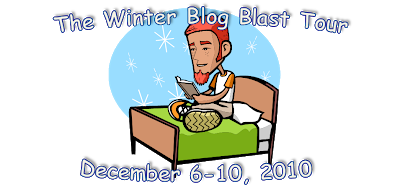 Don’t forget to check out the rest of today’s awesome WBBT author/illustrator interviews:
Don’t forget to check out the rest of today’s awesome WBBT author/illustrator interviews:
Debut author B.A. Binns @ The Happy Nappy Bookseller
Superhero Daisy Whitney @ Bildungsroman,
The spookyfun Grimm Adam Gidwitz @ Fuse Number 8
Artastic Salley Mavor @ Seven Impossible Things Before Breakfast.


Now I must check out The Dark Days of Hamburger Halpin and MasterBerk Theatre
I loved this interview. Thanks so much for squeezing in some extra questions.
MUST READ. I worked for years as a sign language interpreter and my last library job was at a school for the deaf. Yay for all his research…
Thanks for the interview!
p.s. Passing this link on to all my interpreter and teacher friends…
You can't eat a Newbery medal. Or maybe you can, but it probably wouldn't taste good.
Great interview.
Ahhh, so much Berk-y goodness in this deliciously long interview!
Lisa
How did I miss this book? I shall rectify it immediately. Great interview!
You guys will be happy you found him — this is a funny, funny little book, and a great cast of characters. Can't wait to see what's next from this author!
Jules, thanks for passing this along!